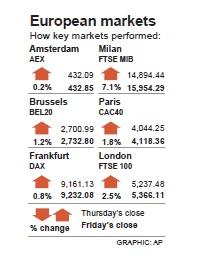European stocks on Friday snapped a six-day losing streak, but made only a small gain over the course of the day as an initial rebound ran out of steam as COVID-19 sowed further economic turmoil.
The region’s stocks, which were earlier set for their best day since late 2008, swiftly pared gains after Spain declared a state of emergency over the pandemic, while reports that the US would follow suit added to the pain.
The benchmark STOXX 600 on Friday closed up 2.64 points, or 0.9 percent, at 299.16 following a record 11.5 percent plunge on Thursday. It was down 18.4 percent from 366.80 on March 6, its worst weekly drop since the 2008 financial crisis.

“These measures that governments are putting into place are just restrictions to movement — these are necessary measures, but nevertheless, they will have a significant economic impact, which the market is still coming to terms with,” London-based TS Lombard head of strategy Andrea Cicione said.
The STOXX 600, which sank into bear territory this week, has lost nearly one-third of its value from a peak hit in the middle of last month.
The week, which started with a shock crash in oil prices, followed by increasing signs of disruptions caused by the virus, saw selling pressure break through even the stimulus measures by several major banks.
Spanish stocks ended higher for the day as the bank-heavy IBEX was supported by higher eurozone bond yields. The index bounced back from a near eight-year low.
Italian stocks, which have been among the hardest hit as the country has been the worst-affected in Europe by the coronavirus outbreak, closed up 7 percent, recovering from a more than seven-year low.
Among the eurozone subsectors, resource stocks were the best performers for the day, bouncing back from a four-year low. Mining heavyweights Evraz PLC and BHP Group Ltd gained more than 12 percent each.
Swiss diagnostics maker F. Hoffmann-La Roche AG rose 3.2 percent after the US Food and Drug Administration issued emergency authorization for a faster coronavirus test made by the company.
Oil and gas stocks were the worst weekly performers. They fell almost 30 percent in their worst week ever in the wake of the oil price crash.
Travel and leisure stocks, which have also come under immense pressure from the outbreak, shed 25.1 percent for the week. The subindex also ended lower for the day, with British cinema operator Cineworld Group PLC sinking 30 percent amid continued concerns over the effects of the outbreak on its business.
Additional reporting by staff writer

CAUTIOUS RECOVERY: While the manufacturing sector returned to growth amid the US-China trade truce, firms remain wary as uncertainty clouds the outlook, the CIER said The local manufacturing sector returned to expansion last month, as the official purchasing managers’ index (PMI) rose 2.1 points to 51.0, driven by a temporary easing in US-China trade tensions, the Chung-Hua Institution for Economic Research (CIER, 中華經濟研究院) said yesterday. The PMI gauges the health of the manufacturing industry, with readings above 50 indicating expansion and those below 50 signaling contraction. “Firms are not as pessimistic as they were in April, but they remain far from optimistic,” CIER president Lien Hsien-ming (連賢明) said at a news conference. The full impact of US tariff decisions is unlikely to become clear until later this month

With an approval rating of just two percent, Peruvian President Dina Boluarte might be the world’s most unpopular leader, according to pollsters. Protests greeted her rise to power 29 months ago, and have marked her entire term — joined by assorted scandals, investigations, controversies and a surge in gang violence. The 63-year-old is the target of a dozen probes, including for her alleged failure to declare gifts of luxury jewels and watches, a scandal inevitably dubbed “Rolexgate.” She is also under the microscope for a two-week undeclared absence for nose surgery — which she insists was medical, not cosmetic — and is

GROWING CONCERN: Some senior Trump administration officials opposed the UAE expansion over fears that another TSMC project could jeopardize its US investment Taiwan Semiconductor Manufacturing Co (TSMC, 台積電) is evaluating building an advanced production facility in the United Arab Emirates (UAE) and has discussed the possibility with officials in US President Donald Trump’s administration, people familiar with the matter said, in a potentially major bet on the Middle East that would only come to fruition with Washington’s approval. The company has had multiple meetings in the past few months with US Special Envoy to the Middle East Steve Witkoff and officials from MGX, an influential investment vehicle overseen by the UAE president’s brother, the people said. The conversations are a continuation of talks that

Alchip Technologies Ltd (世芯), an application-specific integrated circuit (ASIC) designer specializing in artificial-intelligence (AI) chips, yesterday said that small-volume production of 3-nanometer (nm) chips for a key customer is on track to start by the end of this year, dismissing speculation about delays in producing advanced chips. As Alchip is transitioning from 7-nanometer and 5-nanometer process technology to 3 nanometers, investors and shareholders have been closely monitoring whether the company is navigating through such transition smoothly. “We are proceeding well in [building] this generation [of chips]. It appears to me that no revision will be required. We have achieved success in designing